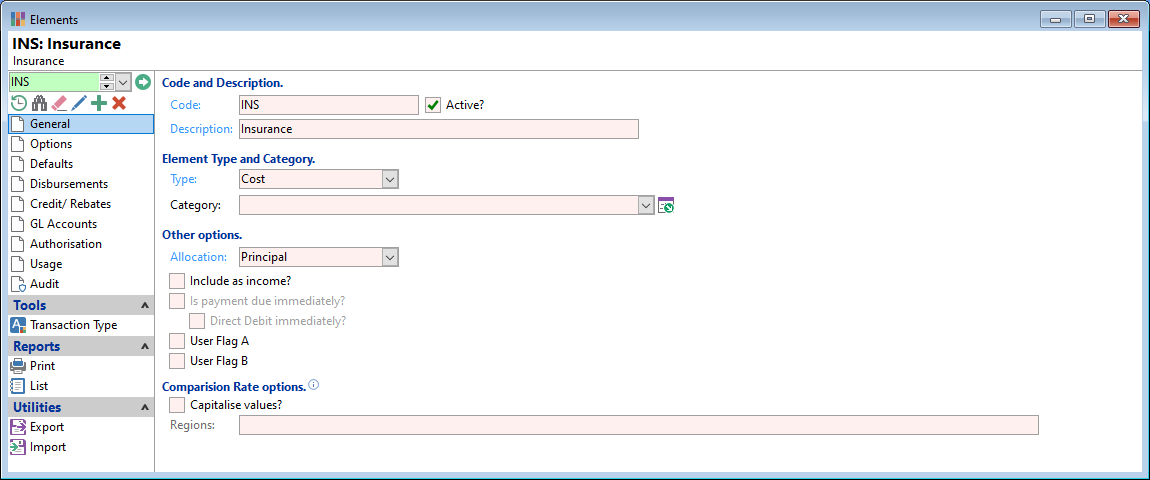
Code and Description
- Code - Each Element requires a unique code of up to twenty characters; a short but meaningful code is best.
- Active - Untick to prevent this Element being available to new records.
- Description - This should be a description that easily identifies the Element.
Type
The Type of the Element will determine its function. Some types are part of the initial Account setup and others are for processing once the Account is active.
The following table shows more information about the Type of Element and whether the Overdues will be automatically impacted.
| Element Type | Description | Is Arrears impacts Optional? |
Automatically impact Arrears? |
|---|---|---|---|
| Additional Investment | Additional Investment value on a Deposit Account. | N/A | N/A |
| Advance | Advances are the actual items being purchased on credit or the amount advanced by way of a personal loan. | No | No |
| Cost | Costs are charges other than the purchase costs that are part of the principal value. | No | No |
| Default Interest | These elements are used for Default/Penalty Interest charges. Default Interest type Elements can be set to due immediately and impact the overdue. | Yes | No |
| Deposit | Deposits are both cash deposits and trade ins. They are any value deducted from the principal before the instalment is calculated. | No | No |
| Disbursement | The Element used for the credit to contra the Advance/Withdrawal. These transactions will not normally appear in the Account Transaction listing. | No | No |
| Fee | This element type is used for Fee transactions posted to the Account. | Yes | No |
| Interest | These elements are used for Standard Interest charges. | No | No |
| Interest Payout | These elements are used for Standard Interest Payouts for Deposit Accounts. | N/A | N/A |
| Investment | These elements are used for the value Invested when setting up a Deposit Account. | N/A | N/A |
| Journal | This element type is used for credit/debit journal type transactions posted to the Account. | Yes | No |
| Payment Due | Payments due are elements for actual instalments due. | No | Yes |
| Payment Received | Payments are processing elements for actual payments received (or reversed). | No | Yes |
| Refinance | This will be used to identify the Refinanced balance in the new Account when refinancing a loan. | No | No |
| Refund | Used when refunding credit balances or over charges. | No | Yes |
| Transfer | The element used when transferring balances or moving a Bank Transaction between Accounts. | Yes | No |
| Withdrawal | For specific types of accounts, these elements are used when a withdrawal is made. | No | No |
Category
Select the Category for the Element if applicable. This allows for custom Element grouping.
Allocation
The Allocation of the Element determines its function and how it is used.
finPOWER Connect allocates payments in the following order:
| Allocation | Description |
|---|---|
| Fees | To allocate the payment or credit to the Fee balance. |
| Fees NIB | To allocate the payment or credit to Non-Interest bearing Fees. |
| Interest | To allocate the payment or credit to the Interest balance. |
| Principal | To allocate the payment or credit to the Principal balance. |
| Principal NIB | To allocate the payment or credit to Non-Interest bearing Principal. |
Include as Income?
Tick where this element is to be included as income. For example, PPSR search fees may be directly on charged and therefore not classed as true income, in these situations make sure the checkbox is unticked.
Is Payment Due Immediately?
Tick so that the charge will be added to the loan payment schedule 'as at' the Transaction date, thereafter default interest may apply if the charge is not 'paid' on that day.
Direct Debit Immediately?
Tick so transactions that are due immediately are also Direct Debited immediately.
User Flag A and B
By ticking the checkboxes for 'User Flag A' and 'User Flag B', the text as entered in Global Settings, Elements, General page, will display as their captions.
These fields can be used by Scripts and External Applications.
Capitalise values?
Tick whether the value will be capitalised to Principal. Normally this only applies to things like Government fees.
Regions
Select the Region this Element applies to i.e. the States in Australia. For example, a fee could apply only to NSW.